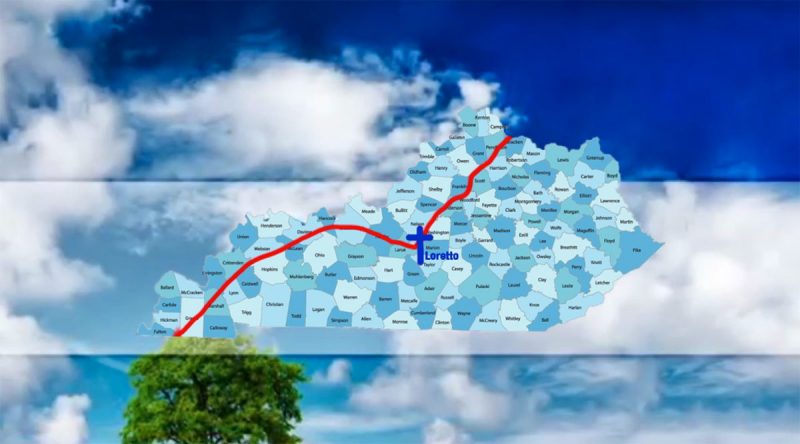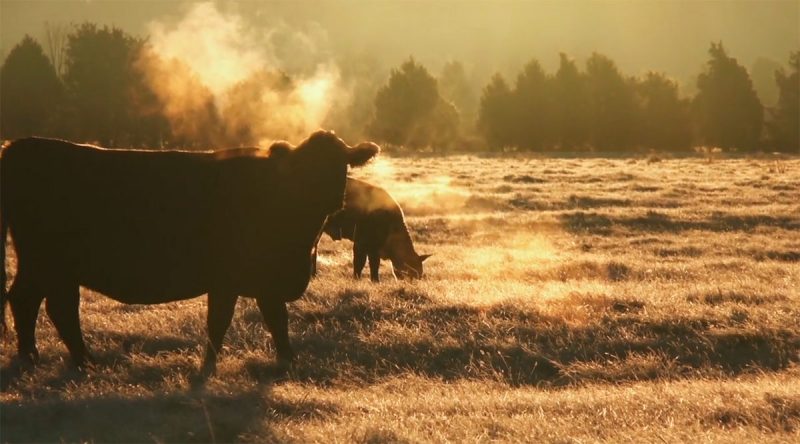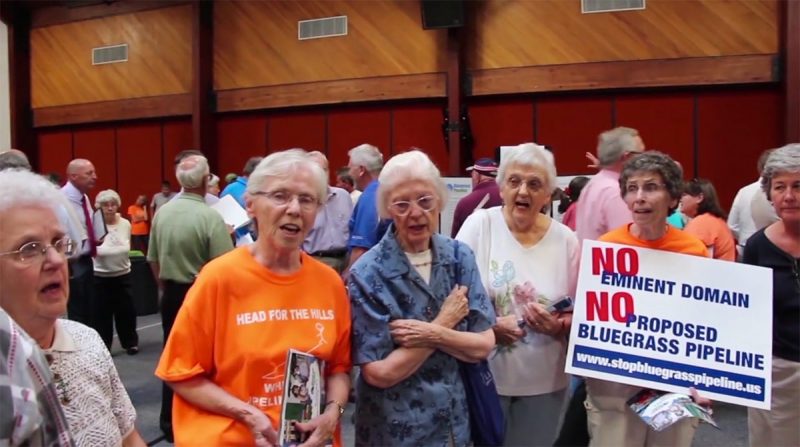Sellus Wilder believes in the power of a grassroots movement—that a group of dedicated citizens can fight the seemingly unwinnable battle against corporate interests—and he has the film to prove it.
In his new documentary, The End of the Line, Wilder recounts the story of how citizens across the Commonwealth banded together in opposition of the Bluegrass Pipeline in 2013 that would have carried fracking waste material through Kentucky.
At 90 minutes long, the film breaks down the economics of the fracking industry and how natural gas liquids (NGLs)—a slurry byproduct of hydraulic fracturing—can be made into cheap plastics. The catch is that NGLs need to be shipped from the fracking mines in the Northeast down to the oil refineries in Louisiana in order to be made profitable.
The film goes on to explain how representatives from Williams Company and Boardwalk Pipeline Partners—the parent company of Bluegrass Pipeline, LLC—tried to work with Kentucky residents and obtain permission to lay a pipeline through 13 counties across the Commonwealth.

At the heart of the film are the people who took it upon themselves to defend what they believed were at stake: land, liberty, and the right to a healthy life. Footage from public hearings are perhaps some of the best segments of the film, as it shows residents clashing with representatives from Bluegrass Pipeline—moments that crackle with tension and demonstrate the David vs. Goliath nature of the conflict.
In addition to filmmaking, Wilder served four years as city commissioner and Mayor pro tem in Frankfort. During his tenure, Wilder required that all public meetings in the city be recorded and posted online in order to increase government transparency. He also made Frankfort the first city in Kentucky to incentivize recycling.
“There used to be a flat fee for garbage collection, but instead we adjusted it so folks could save money on their garbage bill by wasting less and recycling more,” Wilder explained. “The recycling rate went up 40 percent in the first month of its implementation.”
He’s also running for U.S. Senate against six other candidates in the Democratic primary in May, and hopes to face off against Rand Paul in November.
Broken Sidewalk reporter Elijah McKenzie met with Wilder to explore some of the issues raised in The End of the Line, and to find out how the filmmaker hopes to spread his message of a new economic transition in Kentucky.

Elijah McKenzie: Why did you choose the Bluegrass Pipeline as the subject of your first documentary? Did you have a personal connection to the issue?
Sellus Wilder: Initially when I came on to the project, I had a lot of friends who were engaged in the pipeline fight. They asked me to come on board to produce a couple of short videos and interviews with landowners to get a different perspective on the table. At the time, the pipeline company was spending millions of dollars to promote their own point of view and there was no counter-narrative. So the idea was, at the very least, we could present a different side to the story.
After doing just a couple of interviews, it became very clear that there was a deeper story at play. You know, I always thought it was possible that the pipeline could be defeated, so that was one impetus. So it seemed like this was an engaging and exciting fight that was bringing together a diverse coalition, ranging from Tea Partiers and constitutional conservatives, to nuns and farmers, ranchers and environmental groups—all these different people working together to face off against these multi-billion-dollar companies.
What did you discover during the interview process? Did you find that there were more supporters than opponents, or vice versa?
The supporters of the pipeline were actually few and far between. Most of the folks on the ground were opposed to it. Folks from out of state, who were spending lots of money, were supportive of the pipeline.
A lot of those who did support it, at least the folks from Kentucky, were the ones who sold easements to the pipeline company. That was often an unpopular decision for them. Their neighbors were often unhappy with them for taking the money and risking everybody’s health and safety in those areas. So, a lot of the folks who took that money weren’t particularly vocal about it.
I do have a lot of sympathy for those who sold easements. The money they were being offered was hard to turn down. I know it wasn’t an easy decision to make, for both the folks who said yes and the folks who said no. It caused a lot of tension among communities—neighbors were, in some ways, pitted against each other by the pipeline company.
How did that tension play out? In the film, we saw the debates between citizens and representatives from Williams and Boardwalk, but did any of that cause animosity between neighbors?
No, at least not publicly. The closest it ever came to was when some organized labor folks were bused in to Frankfort to oppose an anti-eminent domain bill. A lot of those guys weren’t really told what the bill was about, so I had a lot of sympathy for them because they were just looking for jobs, you know, and I can respect that. I think a lot of them didn’t realize that the bill they were opposing—all it would have done was give landowners the right to say no to a hazardous liquids pipeline on their property. So I think even a lot of those labor guys, once they sat through the hearing and understood the issue that was actually on the table, I think a lot of them actually came around.

Yeah, that was an interesting part of the film. It was a bit perplexing because unions are generally considered allies in the struggle against corporate corruption and that sort of thing. Were you able to talk to any of those guys when you were filming that scene?
No, I wanted to that day but nobody would talk with me. But I will say, my favorite shot in the movie—it’s one of the testimonials that’s given before the judiciary committee—a woman who said, “As a veteran, I fought for these freedoms and these rights. Please don’t take that right away from me.” And she gets up and leaves her seat, and you can see it on the face of one of the labor guys sitting behind her—and you can see it sinking in.
That was a powerful scene. The expression on his face that was sort of this thousand-mile stare that said, “What am I here for?”
Yeah. I regret not being able to talk with them. The pipeline folks wouldn’t talk with me.
None of them?
No. I asked, and they said they would as long as they could have editorial control. If they could get final approval on whether or not any footage I cut was included in the film, they would do it, but that would have been unethical on my part and I just wasn’t willing to go there.
I was still able to incorporate their perspective and comments into the film just by recording them in open meetings. Those comments are a matter of public record and I could film them and include them without their permission, you know, as long as they were speaking at county meetings, state hearings, and that kind of thing. It was important to me that this story not be one-sided. I wanted to present the arguments that were being made on the other side as faithfully and fairly as I could.

Was there ever a moment where you felt like, “Well maybe these pipeline guys have a point?” Did you hear an argument from anyone that made you think twice?
The only argument that had any traction at all was the idea that this would create jobs: 1,500 temporary jobs and 32 permanent jobs. Personally, I never felt that such a small number of permanent jobs were a sufficient reason to risk those many Kentucky families’ health and safety.
I know this showed up in the movie a couple of times, but every time they were asked, “Will you commit to hiring Kentucky workers?” The pipeline representatives’ answer was always, “When we hire a contractor that will do this work, we will include language in that contract expressing our desire for them to hire local labor.” And that’s completely non-binding. So their answer to that question is ultimately no, but they phrased it in a way so that everyone in the room heard yes, so that was pretty slick—but I think a lot of people also saw through that.
The one case they made most frequently that I felt was particularly misleading was they kept arguing that, according to data from the U.S. Department of Transportation, pipelines fail less frequently than any other method of transportation. Trucks, trains, even barges have more accidents than pipelines do—which is true—but what they failed to mention is that according to that very same data set, the damage from pipeline explosions or leaks is exponentially greater than all other transportation method combined.
It makes sense when you think about it because, a single truck, as bad as an accident can be, it’s still smaller—it’s only one truck’s worth of hazardous liquids as opposed to a mile’s worth. It’s also on a transportation route—a space that vehicles can get to easily. Most obviously, it’s localized and above ground, so it’s easier to clean up than an underground pipeline leak that has safety shutoff valves more than a mile apart from each other. Especially in Kentucky’s karst terrain, the leaks can really travel far before anybody is aware of them.

Were you this knowledgeable about pipelines or these types of regulations before making the film?
Not a whole lot. I was aware generically about pipeline issues. Like a lot of people, when I heard the Bluegrass Pipeline was going to carry natural gas liquids, I assumed that was something similar to natural gas or even liquefied natural gas. But of course, they’re completely different animals.
NGLs generally aren’t an energy source. They’re used as a feedstock for the petrochemical industry, so NGLs are mostly used to manufacture cheap plastics—as opposed to natural gas or liquefied natural gas, which are energy sources.
A natural gas pipeline would, theoretically, offshoot and serve energy to consumers along its route, but the NGL pipeline wouldn’t have had any offshoots. It wouldn’t have served anyone in Kentucky, it just would’ve passed through down to Louisiana.
The reason they wanted to go to Louisiana was twofold. One, it’s because that’s where the American petrochemical industry is located. These NGLs are like slurry—it’s like crude oil, you can’t do anything with them until you refine them and process them. So the plants that can handle them are located down at the Gulf of Mexico.
Williams Company was also involved in building a major export facility that just happened to be right there at the end of the pipeline route, which really undercut their claim that this was for American energy. I mean, even their internal documents reveal that a big part of their plan was exporting this stuff overseas.

I want to return to the topic of eminent domain, which came up a lot in the film. Was there anyone you spoke to that had legitimate fears about having their property taken?
Lots of people were. Yeah, that came up pretty frequently in negotiations and discussions with property owners. The companies never actually filed eminent domain proceedings against anyone, but the conversations frequently went along the lines of, “We’re making you this offer for an easement through your property and you should really consider taking it because we have the power of eminent domain. So you can take this good offer now, or we’ll take you to court and you’ll probably get a lot less, so I recommend you take us up on this offer now.”
So they didn’t even have to file eminent domain in order to use it as an unjust negotiating tactic. They were using it to scare property owners into selling easements. That’s why citizens banded together and took them to court, it’s because they needed to clarify that the pipeline companies, in fact, did not have the power of condemnation. The nature of that court case—and I don’t know how well the movie made this clear—but that was a case that was initiated by our side of things.
And you won in court.
We did. The courts clarified the current eminent domain laws, which upheld the rights of the landowners. As far as legislation goes, the Kentucky House of Representatives passed an anti-eminent domain bill, but the Senate never took it up. It never even got a committee hearing.
Still, the pipeline companies did ultimately decide to suspend the project.
Right, but only because they couldn’t get enough customer commitments. NGLs come from the fracking industry—those companies sign long-term leases with pipeline companies to transport their NGLs to market. But they couldn’t get enough customers to make that long-term commitment.
That was part of our agenda throughout the entire process. That’s one reason we kept pushing forward in the legislature, even when it looked like we weren’t going to get a hearing in the Senate. That’s why we felt it was important to take them to court. And that’s why I was working hard on the PR end of things. We wanted to make it clear to Wall Street and to the investing class that this project wasn’t a done deal—it wasn’t a sure thing because there was a lot of opposition in Kentucky. Our hope was if we could convince enough of their potential customers that this was a bad investment, then they would have a harder time signing on. So, the grassroots opposition really did affect the outcome of the project.
Do you know what happens to the NGL’s if fracking companies can’t sell them? Are they just dumped somewhere?
Well, they used to be flared off, but the fracking industry has experienced a lot of decline in recent years. That’s largely because there was a huge boom when it first started, and the supply exceeded the demand, which caused prices to go down and the whole business became less profitable.
One of the incentives for fracking companies to push and sell these NGL’s is to boost the bottom line for a failing industry. Now, if they’re not going to go through the pipeline, they can still be transported via other means, but they’re just on truck or rail now. And the reason companies prefer pipelines is because it’s the most cost-effective way to transport these liquids – it’s less safe, slower, and less flexible than trucks and rail, but it’s cheaper.
For the pipeline companies, their argument has been, “If we can get this pipeline built – which would make fracking profitable again – then we can expand fracking in the Northeast.” So it’s our sense that preventing the pipeline actually slowed the expansion of fracking in the Northeast.
The End of the Line was awarded an IndieFEST Global Film ‘Award of Recognition’ in the category of “Liberation / Social Justice / Protest” in November 2015 and most recently won the Spirit of Activism Award at the 2016 Colorado Environmental Film Festival in February.
For more information about The End of the Line and other works by Sellus Wilder, visit SellusWilder.com.



This is an excellent article, Elijah! Clear, concise, and chock-full of information essential to the knowledge base of the citizens of this region, the nation, and the world. Thanks to you and to Sellus for this great work!!!